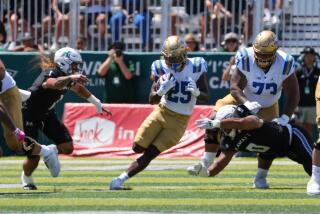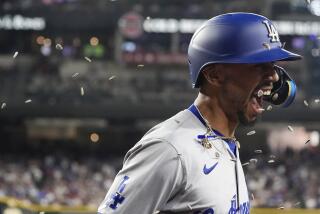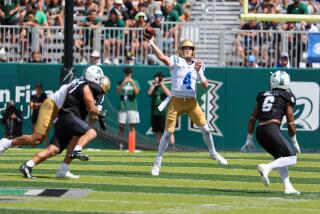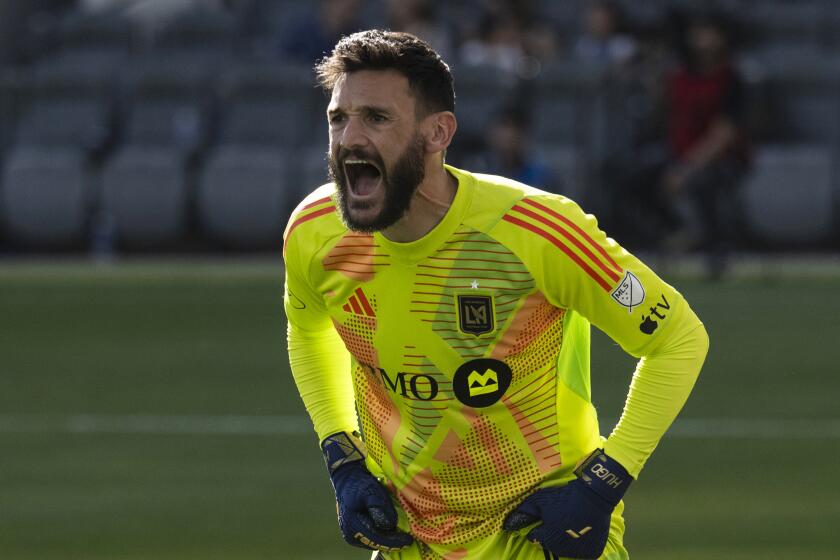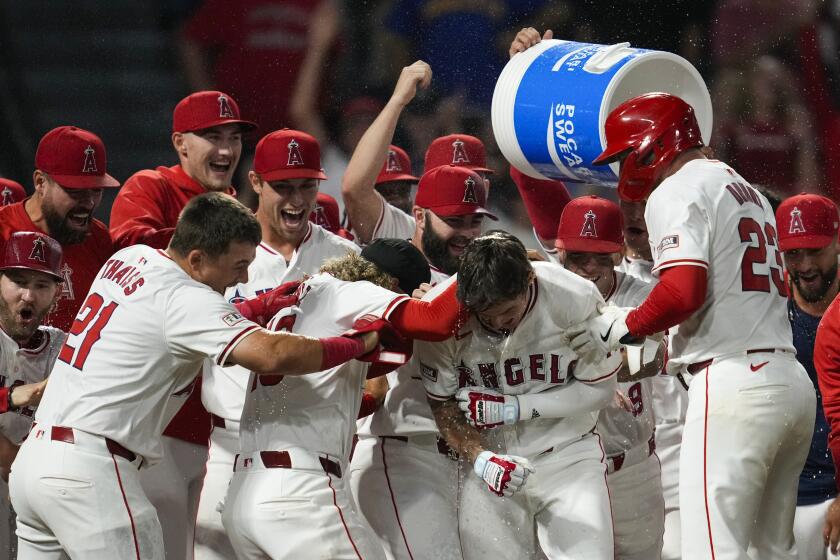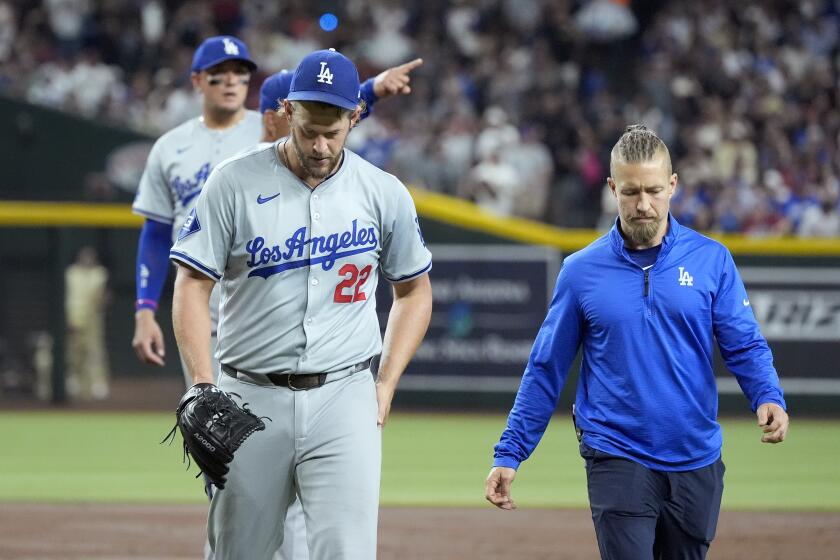Musselman Is Courting Success
The memory is a decade old, but Kris Musselman has not forgotten any of its revolting details.
As she sat in the stands watching her son, Eric, play an away high school basketball game, she could hardly believe what she was seeing.
While Eric played, fans hurled hot dogs at him and held up signs as they viciously displayed their distaste for his father, Bill, who was coaching the Cleveland Cavaliers.
“The whole way home I cried,” Kris said. “I thought it was terrible what these people were doing to a 16-year-old kid. I would have told him to walk away from it. But Bill said it was part of athletics. He said it would make Eric into a tougher individual.”
Said Eric: “It wasn’t a pleasant situation. Whenever I went into visiting arenas, it was tough. You just become hardened to it, and you play a little harder. I think it helped me grow up quicker.”
Kris now acknowledges that incident and others like it actually strengthened her son.
“Eric thrived on it,” said Kris, who is divorced from Bill and lives in La Jolla. “It was probably the real making of Eric.”
Eric Musselman, who played basketball at University of San Diego from 1984 to 1988, has continued to thrive under similar circumstances.
At 23, he was named general manager of the Continental Basketball Assn.’s Rapid City Thrillers. Although he was given the job largely on his father’s recommendation, Musselman proved himself immediately.
Showing all the shrewdness of an Al Davis, he made nine trades his first day on the job. By week’s end, he had traded the entire 10-man roster. And by season’s end, Musselman had transformed the 16-38 Thrillers into a team with a 38-16 record--the league’s best.
The next year, Musselman reluctantly took on the additional duties of coaching the South Dakota franchise. With no experience, Musselman, then 24, led Rapid City to a 42-14 record, second best in CBA history.
With only that year of coaching experience, Bill hired him as one of his assistants with the NBA’s Minnesota Timberwolves. Musselman was fired along with his father after last season, but Thrillers’ owner, Pat Hall, quickly hired him back as the team’s coach and general manager.
In fact after the Thrillers’ slow start last season, Hall was on the phone to Minnesota--trying to woo Musselman back to Rapid City.
Also wooing him back to the area was his fiance Wendy Wickle, who is from there.
At 26, Musselman appears to be far ahead of the game. While most coaches pay their dues at the high school or junior college level, Musselman’s training ground was professional basketball.
Most who know him say it has nothing to do with luck or his last name. They believe it has everything to do with his amazing knowledge of the game, his fiery intensity and his ability to relate to people.
People who know Eric and Bill say the first two virtues were acquired from Bill, but the last one sets them apart.
Although Bill has enjoyed his share of successes in nearly 30 years of coaching, he has been criticized throughout his career for being too tough on his players and at times insensitive to management’s wishes.
Kris said she doesn’t believe Eric will make the same mistakes.
“Eric knows the competitiveness has to be tempered,” she said. “He’s very much a people’s person. I think he’ll be more successful than his dad. His know-how with people will get him far.”
Said Barry Hecker, player personnel director of the Los Angeles Clippers, who gave Eric his first job out of USD: “Eric has the same work ethic as Bill, but he has more people skills. He has more empathy.”
And he seems to have the sense to occasionally escape the sport when it threatens to consume him.
“My dad’s life is basketball,” Eric said. “I have a few more interests--more outlets. I like to go out with friends, go to the beach.”
Said Kris: “Eric has the ability to find other facets of his life that are rewarding when he’s off the court.”
But on the court, Hall says the two are incredibly alike.
“They’re both as intense as I’ve ever met,” Hall said. “I’d rate them 1 and 2, and I’m not sure Bill is No. 1.”
In Eric’s rookie year of coaching, he showed that intensity--he was among the league leaders in technical fouls. Ex-Indiana standout Keith Smart, who played for Musselman that year, remembers a game from which Eric was ejected.
“I saw him throw off his coat and before I knew it, he was out on the floor at midcourt,” Smart said. “But that’s why the players respected him so much--he stuck up for his players.”
Hall said he began to recognize Musselman’s vigor over the airwaves. During his first season as general manager, Musselman also doubled as a color commentator for the Rapid City radio station.
“He was supposed to be commentating on the game, but sometimes you’d hear some choice words come over the radio that were directed at the officials,” Hall said. “I don’t think they were supposed to get on the air.”
The will to win sometimes gets the best of Musselman. But Kris believes her son would be nowhere without it.
“Eric is a real overachiever and he always has been,” Kris said.
Eric Musselman started overachieving during his high school basketball career. Although he was only 5-feet-7, Musselman averaged 24 points a game his junior year for Brecksville High, finishing fourth in the city of Cleveland in scoring.
“He was kidded all his life about his height,” Kris said. “But he practiced harder and longer than most kids.”
The extra practice earned him a scholarship to USD, where he played under Jim Brovelli and Hank Egan. But even though his lack of size limited his playing time, Musselman made the best of the situation.
He absorbed the wisdom of Egan and Brovelli, and occasionally interjected some of his own knowledge, which he gained from watching his father.
“Sometimes in the huddle, he gave us some pretty good advice,” Egan said. “He really understood the game.”
When did Egan realize Musselman had ability to be a coach?
“The first day I met him,” he said.
For others, it took even less time for Musselman to make an impression. Hecker hired Musselman as a research assistant after talking to him for 30 minutes.
“He reminded me of myself,” Hecker said. “He had that same aggressiveness. I was looking for someone who was hungry and wanted to get his foot in the door.”
Before he landed the Clippers’ job, Musselman considered going to law school. But he quickly changed his mind.
“The one thing I knew best and liked best, was basketball. I can’t ever see myself doing something else,” said Musselman, who acknowledges his childhood had much to do with that. “I never had much interest in going to Disneyland or the zoo. I just wanted to follow my dad around to practice.”
Musselman’s aptitude and love of the game convinced Thrillers owner Hall that he better not let this “kid” slip away.
“Everybody in the league laughed at me when I flew him up here for an interview,” Hall said. “But right away I could see how sharp he was.”
Musselman wanted to stay with Hecker out of loyalty. He also felt he was too young for the job. But Hall eventually persuaded Musselman to become the youngest general manager in league history.
Not only did Musselman turn Rapid City into a winner on the court, he also turned the franchise’s financial fortunes around.
The year before he took over as GM, the team lost $225,000 with Tom Nissalke running it. In Musselman’s first year, the Thrillers made $25,000. The following year, Musselman’s promotions and the team’s winning record helped put the Thrillers’ $100,000 in the black.
But Hall said much of Musselman’s success in 1989 and 1990 came from his ability to spot talent.
“Eric probably has a wider knowledge of players than Bill does,” Hall said. “When we drafted Stevie Thompson (from Syracuse) everyone laughed at us. But Stevie wound up being one of the best players in the league.”
Hall said Musselman is constantly calling him at all hours informing him of possible moves.
“We’ll talk at 11 p.m. and then, he’ll call me again at 3 a.m.,” Hall said. “He’s always working to improve the club.”
Musselman spent last weekend evaluating the latest crop of college players at a pre-draft camp in Chicago. Players who are not drafted by NBA teams are eligible for the CBA draft, which will take place in August.
Egan and Hecker said CBA teams essentially act as triple-A affiliates for NBA teams. An NBA player’s rights belong to certain CBA teams when they are waived, although a player can become a free agent a year after he is waived by an NBA club.
One of Musselman’s better acquisitions in the 1989-90 season was point guard Michael Williams, who had been waived by the Dallas Mavericks.
Williams had also been released by Detroit and Phoenix earlier in the season, and he was on the verge of quitting the game.
“I was contemplating going back to school,” Williams said. “But Eric said, ‘Mike, people just need to see you.’ ”
Said Hall: “Eric would not let Michael Williams sleep until he said he would come play for us.”
Williams, who now starts for the Indiana Pacers, credits Musselman for turning around his career.
“I went into that experience thinking negatively,” Williams said. “But Eric just made everything so loose. That was really the first time (since college) that I got the opportunity to play night in and night out. He would tell me, ‘Mike, you’re too good to be down here.’ ”
Bill said Eric always has had a knack for seeing talent.
“When Eric says a guy can play, he can play,” Bill said. “He also told me Scottie Brooks can play. I didn’t believe him, but Scottie has played in the (NBA) for three years.”
There is probably not a player alive whom Eric doesn’t know about. He prides himself on being a basketball guru. For the past two years Musselman and his cousin, Chris Anderson, have put out their own minor league basketball newsletter. In it, Musselman writes scouting reports on teams and players from the CBA, World Basketball League, U.S. Basketball League and Global League.
How does Musselman fit it all into his busy schedule?
“Eric is the most organized person I’ve ever been around,” Bill said. “When he was a kid, he would lay out his clothes the night before school. And then on the road last year, he would be packed the night before we were leaving.”
Said Kris: “Eric has lists all over the house. He started making them when he was little.”
But for all the inherent coaching qualities that Musselman possesses, neither his mother nor his father figured he would enter the profession.
“He never mentioned it to me at all until he got out of school,” Bill said.
Kris knew the pressures Eric would encounter in coaching, but she never steered him away from it.
“I told Eric to do what he enjoyed doing in life,” she said. “And from the time, he was old enough to walk, he had a basketball in his hand.”
Musselman couldn’t have been placed himself in more high-pressured situation than Rapid City. His father had just won four consecutive CBA championships--three with Tampa Bay and one with Albany. If he failed, people would be able to say “He only got the job because of his father. He didn’t deserve it.”
“I told him the pressure would be unbearable,” Bill said. “You don’t want him to face the pressure that you’ve faced. But I know that he’s tough mentally. I think he took on the challenge unbelievably well.”
But even though Musselman has met every challenge, he has experienced the down side of coaching--getting fired. He is not bitter about his brief stint in Minnesota.
“How could I be?” he said. “They gave me a chance to coach in the NBA.”
However, Musselman is unhappy about the way his father--who still is out of a job but collecting his salary for the final year of his contract--was treated by the media and the organization.
“When my dad’s team takes the floor, he wants them to play harder than anybody else,” he said. “I think they took over his personality. (The Timberwolves) got a good deal out of it. I think he proved to people he could still coach in the NBA. In two years, we had the best record of all the expansion teams. I just thought (the firing) wasn’t justified.”
So why does he want to work in a field with such little job security?
“Coaching is what gets the juices flowing,” he said. “It’s like playing. The way I coach, I’m drained after the game. I enjoy the highs and the lows.”
Those who know him believe there will be more highs than lows.
“I’ve always told Eric that he’s going to be an NBA coach,” said Michael Williams.
“There’s going to be a day when they’re talking about Eric in the NBA,” Hall said.
But for now, they’ll talk about him in the CBA.
“Now that he’s back, the rest of the league is scared--and that’s basically because of one individual,” Hall said. “I’m 45 years old and I’m not ashamed to say I owe most of my success in basketball to a 26-year-old kid.”
More to Read
Go beyond the scoreboard
Get the latest on L.A.'s teams in the daily Sports Report newsletter.
You may occasionally receive promotional content from the Los Angeles Times.
